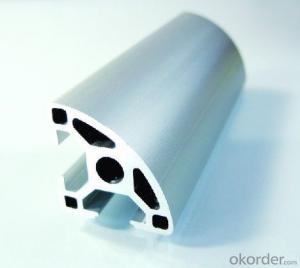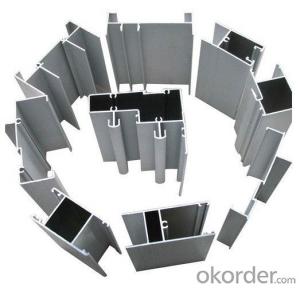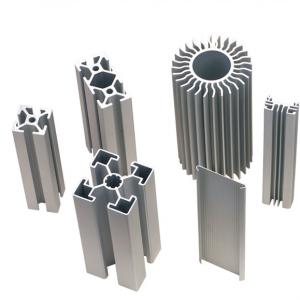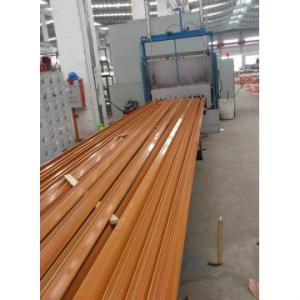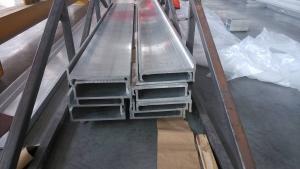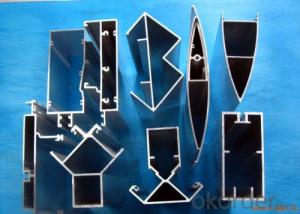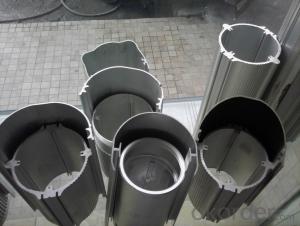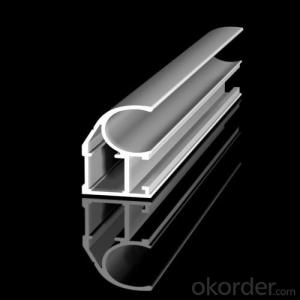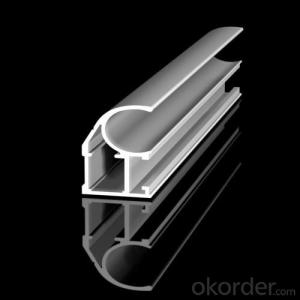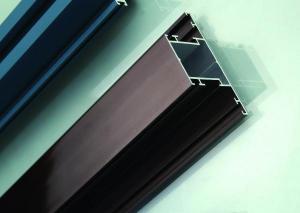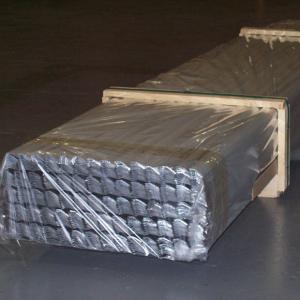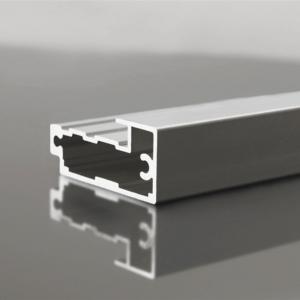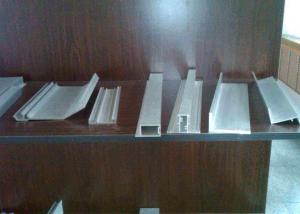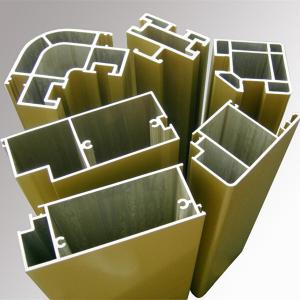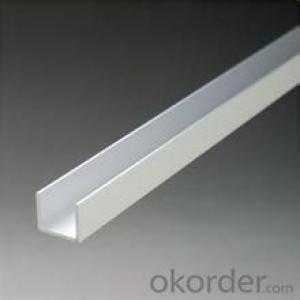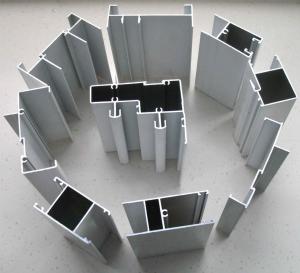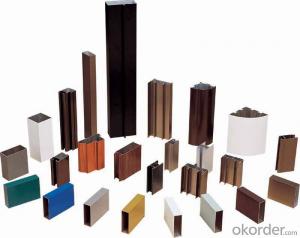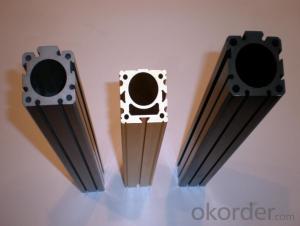Aluminum Profiles Made in China Alloy 6 Series
- Loading Port:
- Shanghai
- Payment Terms:
- TT OR LC
- Min Order Qty:
- 1 m.t.
- Supply Capability:
- 1000 m.t./month
OKorder Service Pledge
OKorder Financial Service
You Might Also Like
Item specifice
1. Specification of Aluminum Profiles Made in China Alloy 6 Series
Alloy | State | Tensile Strength δbMpa | Non-proportional Stretching Stress(δp0.2Mpa) | Stretching rate (δ%) | Pattern Thickness (mm) | HV | HW |
No Less Than | |||||||
6061 | T4/T6 | 180/265 | 110/245 | 16/8 | - | - | - |
6063 | T5/T6 | 160/205 | 110/180 | 8/8 | 0.8/- | 58/- | 8/- |
6063A | T5/T6 | 200,190/230,220 | 160,150/190,180 | 5,5/5,4 | 0.8,0.8/-,- | 65,65/-,- | 10,10/-,- |
2. Application of Aluminum Profiles Made in China Alloy 6 Series
wall cladding, ceilings, bathrooms, kitchens and balconies, shutters, doors,windows…
3. Feature of Aluminum Profiles Made in China Alloy 6 Series
Surface Quality :
Be free from Oil Stain, Dent, Inclusion, Scratches, Stain, Oxide Decoration, Breaks, Corrosion, Roll Marks, Dirt Streaks and other defect which will interfere with use,
Mochenical Property:
Chemical Composite and Mechanical Property
4. Certificate:
SGS and ROHS(if client request, paid by client), MTC(plant provided), Certificate of Origin(FORM A, FORM E, CO), Bureau Veritas and SGS (if client request, paid by client), CIQS certificate
5. Image of Aluminum Profiles Made in China Alloy 6 Series
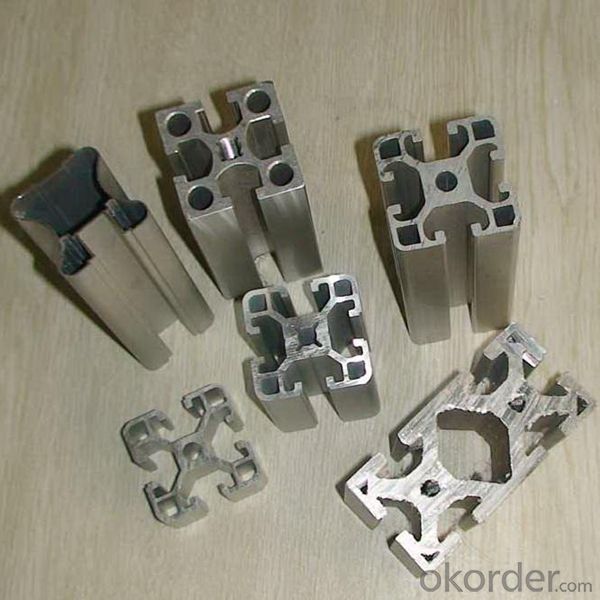
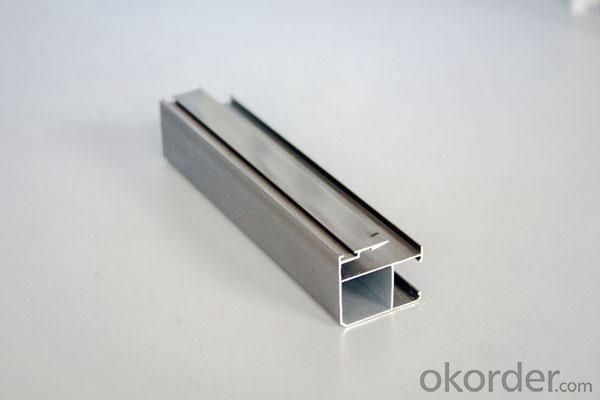
6. Package and shipping of Aluminum Profiles Made in China Alloy 6 Series
First, plastic cloth with drying agent inside; Second, Pearl Wool; Third, wooden cases with dry agent, fumigation wooden pallets, aluminum surface could cover blue PVC film
7. FAQ
Question 1: What is your MOQ?
We accept one ton per type for an order. But the detail we could negotiate.
Question 2: What is your normal terms of payment?
We always trade with you by T/T. But we also accept the L/C as you require.
Question 3: How many kinds of the surface treatment we can choose?
You could choose different color of powder coated. Anodized of black. matte silver, nature, champagne, bronze color. Mill finished. Wooden finished and printed.etc.
Question 4: Can you supply OEM services?
We offer OEM services for 17 years.
Question 5: How many days for opening the mould?
Normally about 10 days.According to the difficulty of your drawing.
Question 6: Can i choose the package what i want?
Yes, of course. We offer various kinds of package.e.g.PE foam. Shrink film. Wrapping paper.
But we would give you professional suggestion of package.
- Q:Are aluminum profiles suitable for use in furniture fittings and accessories?
- Yes, aluminum profiles are suitable for use in furniture fittings and accessories. Aluminum is lightweight, durable, and resistant to corrosion, making it an ideal material for various furniture applications. Additionally, aluminum profiles can be easily fabricated into different shapes and designs, allowing for versatility in furniture design.
- Q:Can aluminum profiles be used in transportation and logistics applications?
- Yes, aluminum profiles are commonly used in transportation and logistics applications. Aluminum profiles are lightweight yet strong, making them an ideal choice for various components in the transportation and logistics industry. In the automotive sector, aluminum profiles are used in the manufacturing of car frames, chassis, and body panels. Their lightweight nature helps reduce the overall weight of the vehicle, resulting in improved fuel efficiency and lower emissions. Additionally, aluminum profiles offer excellent corrosion resistance, ensuring the longevity of the vehicle in harsh environmental conditions. In the aerospace industry, aluminum profiles are extensively used in the construction of aircraft structures, such as wings, fuselage, and landing gear. The high strength-to-weight ratio of aluminum profiles allows for increased payload capacity and fuel efficiency. Moreover, aluminum profiles can withstand extreme temperature variations and have good electrical conductivity, making them suitable for various aerospace applications. In the logistics sector, aluminum profiles are used for constructing cargo containers, pallets, and storage racks. The lightweight nature of aluminum profiles facilitates easy handling and transportation of goods. Additionally, aluminum profiles offer high resistance to rust and corrosion, ensuring the durability of logistics equipment even in humid or corrosive environments. Furthermore, aluminum profiles can be easily customized and fabricated to meet specific design requirements in transportation and logistics applications. They can be extruded into various shapes and sizes, allowing for versatility in design and functionality. Moreover, aluminum profiles can be joined using various methods like welding or fastening, providing flexibility in assembly and maintenance. In conclusion, aluminum profiles are indeed suitable for transportation and logistics applications due to their lightweight, strength, corrosion resistance, and versatility. They offer numerous benefits such as improved fuel efficiency, increased payload capacity, and durability in harsh environments. Thus, aluminum profiles are widely used in automotive, aerospace, and logistics industries for various components, contributing to the efficiency and reliability of transportation and logistics systems.
- Q:How do I choose the right aluminum profile for my project?
- When choosing the right aluminum profile for your project, there are several factors you should consider. Firstly, you need to determine the specific requirements of your project. Consider the purpose and function of the aluminum profile, as well as any specific dimensions or specifications it needs to meet. This will help you narrow down your options and ensure you choose a profile that is suitable for your project. Next, think about the type of aluminum profile that would be most appropriate for your project. There are various types available, such as T-slotted profiles, angle profiles, or channel profiles. Each type has its own advantages and applications, so it's important to understand the differences and select the one that best fits your needs. Consider the strength and durability of the aluminum profile. Evaluate the load-bearing capacity and resistance to corrosion or other environmental factors. Depending on the nature of your project, you may need a profile that can withstand heavy loads or harsh conditions. Another important factor to consider is the compatibility of the aluminum profile with other components or systems. If you plan to use the profile in conjunction with other materials or hardware, ensure they are compatible and can be easily integrated. Additionally, take into account the cost and availability of the aluminum profile. Compare prices from different suppliers and consider the availability of the profile in the required quantity and timeframe. Lastly, it can be beneficial to seek expert advice or consult with professionals who have experience working with aluminum profiles. They can provide valuable insights and recommendations based on their knowledge and expertise. By considering these factors, you can make an informed decision and choose the right aluminum profile that will meet the specific requirements of your project.
- Q:Can aluminum profiles be used in railway and transportation infrastructure?
- Certainly, railway and transportation infrastructure can make effective use of aluminum profiles. Aluminum, being a lightweight and durable material, presents numerous advantages in these specific applications. The utilization of aluminum profiles in railway and transportation infrastructure offers a primary benefit, which is their low weight. Compared to materials like steel, aluminum is significantly lighter, making transportation and installation simpler. This reduction in weight can also result in energy savings since it requires less fuel to move the infrastructure components. Furthermore, aluminum profiles possess a high strength-to-weight ratio, enabling them to withstand heavy loads while remaining relatively lightweight. This characteristic makes them suitable for various structural purposes, such as supporting overhead power lines, constructing platforms, and forming the framework for bridges and tunnels. Aluminum also exhibits excellent resistance to corrosion, which is crucial in railway and transportation infrastructure that is exposed to harsh weather conditions and environmental elements. Aluminum profiles can endure moisture, UV rays, and other corrosive agents, thereby reducing maintenance requirements and prolonging the lifespan of the infrastructure. Moreover, aluminum profiles can be easily fabricated and customized to meet specific design requirements. They can be extruded into diverse shapes and sizes, allowing for flexibility in design and construction. Additionally, aluminum profiles can be readily joined together using different methods, such as welding or fastening, ensuring ease of assembly and disassembly if necessary. In conclusion, it is indeed possible to employ aluminum profiles in railway and transportation infrastructure. Their lightweight nature, high strength, corrosion resistance, and versatility make them an exceptional choice for various structural and functional applications within these sectors.
- Q:Can aluminum profiles be used for soundproofing or acoustic applications?
- Indeed, soundproofing or acoustic applications can make use of aluminum profiles. Aluminum is renowned for its remarkable ability to dampen sound, rendering it a perfect material choice for constructing sound barriers or enclosures. Its robust structural properties and capacity to either absorb or reflect sound waves effectively diminish noise transmission. Moreover, aluminum profiles can be readily tailored and manufactured into various forms and dimensions to cater to specific acoustic needs. Whether employed in walls, partitions, doors, or enclosures, aluminum profiles play a significant role in reducing sound transfer and creating a more tranquil and pleasant atmosphere.
- Q:Can aluminum profiles be cut to size?
- Yes, aluminum profiles can be cut to size. Aluminum profiles are typically manufactured in standard lengths and can be easily cut to the desired length or size using various cutting methods such as sawing, shearing, or CNC machining. This allows for customization and flexibility in using aluminum profiles for different applications.
- Q:Can aluminum profiles be used for modular storage systems?
- Yes, aluminum profiles can definitely be used for modular storage systems. Aluminum is a lightweight yet sturdy material that is commonly used in various industries for its durability and versatility. It is particularly well-suited for modular storage systems due to its ability to be easily cut, shaped, and joined together. Aluminum profiles provide a great solution for creating customized storage units that can be easily adjusted or expanded as needed. They can be used to build shelving systems, cabinets, drawers, and other storage components. The modular design allows for easy assembly and disassembly, making it convenient to rearrange or reconfigure the storage system whenever required. Furthermore, aluminum profiles offer excellent corrosion resistance, ensuring that the storage system will remain in good condition even in harsh environments. They are also available in a variety of finishes, allowing for customization to match the desired aesthetic or design requirements. Overall, aluminum profiles provide a cost-effective and durable solution for modular storage systems, offering flexibility, ease of use, and long-lasting performance.
- Q:Why should aluminum surface treatment process?
- He devotes himself to aluminum passivation, electroplating and surface treatment, and has problems to visit at any time.
- Q:Industrial aluminum profiles are generally used in what industry?
- Kunshan Austrian crown aluminum to tell you: mainly used in the manufacture of industrial production, such as automation equipment, covering the skeleton and the custom mold machinery and equipment according to their own requirements, such as assembly line conveyor belt, hoisting machine, glue machine, testing equipment, shelves and so on, electronic machinery industry and clean room with.
- Q:How do you ensure proper electrical grounding with aluminum profiles?
- To ensure proper electrical grounding with aluminum profiles, there are a few key steps that need to be followed. Firstly, it is important to ensure that all aluminum profiles are clean and free from any dirt, dust, or oxidation. This can be achieved by using a suitable cleaning agent or solvent to remove any contaminants that may hinder the grounding process. Next, proper electrical grounding can be achieved by using conductive hardware such as grounding clips or brackets specifically designed for aluminum profiles. These hardware components should be securely attached to the aluminum profiles, ensuring a reliable electrical connection. Additionally, it is crucial to establish a solid electrical connection between the aluminum profiles and the grounding system. This can be achieved by using copper or aluminum grounding conductors that are properly sized and securely connected to both the aluminum profiles and the grounding system. Furthermore, it is important to regularly inspect the grounding system to ensure its effectiveness. This can involve checking for any loose connections, signs of corrosion, or damage to the grounding conductors. Any issues should be promptly addressed and repaired to maintain proper electrical grounding. Lastly, it is recommended to consult with a qualified electrician or engineer who specializes in electrical grounding when working with aluminum profiles. They can provide specific guidance and ensure compliance with relevant electrical codes and standards to ensure proper and safe electrical grounding.
1. Manufacturer Overview |
|
|---|---|
| Location | |
| Year Established | |
| Annual Output Value | |
| Main Markets | |
| Company Certifications | |
2. Manufacturer Certificates |
|
|---|---|
| a) Certification Name | |
| Range | |
| Reference | |
| Validity Period | |
3. Manufacturer Capability |
|
|---|---|
| a)Trade Capacity | |
| Nearest Port | |
| Export Percentage | |
| No.of Employees in Trade Department | |
| Language Spoken: | |
| b)Factory Information | |
| Factory Size: | |
| No. of Production Lines | |
| Contract Manufacturing | |
| Product Price Range | |
Send your message to us
Aluminum Profiles Made in China Alloy 6 Series
- Loading Port:
- Shanghai
- Payment Terms:
- TT OR LC
- Min Order Qty:
- 1 m.t.
- Supply Capability:
- 1000 m.t./month
OKorder Service Pledge
OKorder Financial Service
Similar products
New products
Hot products
Hot Searches
Related keywords
